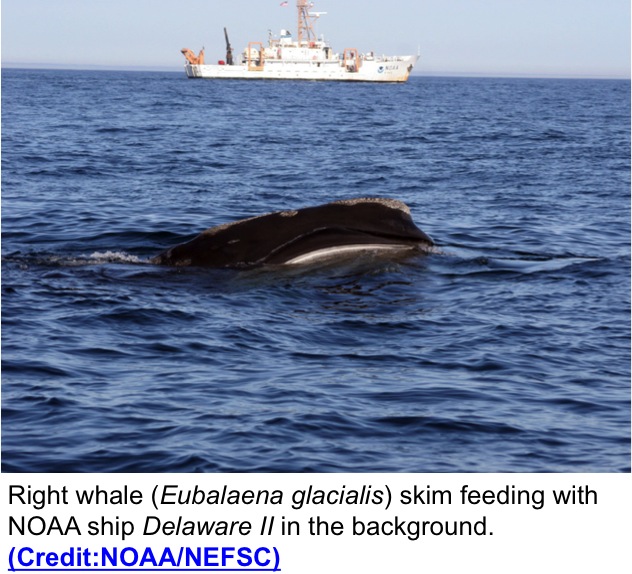Slow Down Shippers, Watch Out for that Whale!
5 years ago, the National Oceanic and Atmospheric Administration (NOAA) of the United States Department of Commerce implemented rules to reduce the number of collisions between ships and North Atlantic right whales.
In December, the rules are scheduled to expire. NOAA would like to make the rules permanent.
NOAA’s proposal to make the rules permanent include a 60-day public comment period that ends August 6th and they want to hear from you on this topic.
 NOAA’s article on their proposal explains, “Right whales are among the most endangered species in the world, and are highly vulnerable to ship collisions…. The existing rules, which reduce an ocean-going vessel’s speed to 10 knots or less during certain times and locations along the East Coast from Maine to Florida, have reduced the number of whales struck by ships since 2008, when the speed limits began. No right whale ship strike deaths have occurred in Seasonal Management Areas since the rule went into place. Modeling studies indicate the measures have reduced the probability of fatal ship strikes of right whales by 80 to 90 percent.”
NOAA’s article on their proposal explains, “Right whales are among the most endangered species in the world, and are highly vulnerable to ship collisions…. The existing rules, which reduce an ocean-going vessel’s speed to 10 knots or less during certain times and locations along the East Coast from Maine to Florida, have reduced the number of whales struck by ships since 2008, when the speed limits began. No right whale ship strike deaths have occurred in Seasonal Management Areas since the rule went into place. Modeling studies indicate the measures have reduced the probability of fatal ship strikes of right whales by 80 to 90 percent.”
That certainly makes the rules sound effective. Should the rules be made permanent? NOAA certainly thinks so:
“’Reducing ship speeds in areas where there are endangered right whales works,’ said NOAA Fisheries’ acting administrator Sam Rauch. ‘It is a proven method to reduce deaths and serious injury to these incredible creatures. Making these protections permanent will make U.S. East Coast waters safer for right whales, and will allow them to reach full maturity, which is critical to their long-term survival.’”
What about the other side? How do these rules impact the international shipping industry? Here’s what NOAA has to say on that:
“NOAA’s revised estimates indicate that the restrictions cost the shipping industry and other maritime communities about one-third of original 2008 projections. NOAA scientists say that industry participation and compliance is high, and that in most cases vessels have incorporated speed restrictions into their standard operations and voyage planning.”
I would think reducing collisions with right whales would bring a reduction in the risk of damage to ships and cargo in the shipping containers on board, but I’m just projecting there.
With the shipping industry making a serious effort toward greener operations over the last several years and many of the carriers implementing slow steaming techniques with their ships to conserve fuel costs, I don’t see the shipping industry being against these rules. It’s not like these rules will stop import and export ocean freight activity.
It’s unlikely that the general public would be against rules that protect right whales.
Protected under the U.S. Endangered Species Act and the Marine Mammal Act after being hunted to extremely dangerously low numbers by whalers, right whales have a long way to go in recovering their population.
The biggest dangers the right whales currently face are collisions with ships and entanglements in fishing nets.
The Endangered Species Act of 1973 requires recovery plans to serve as guides to promote the conservation and recovery of endangered species like the North Atlantic right whale.
Taking into consideration the success of the rules over the last five years, the legally protected status of the whales, and the legal necessity of such a plan, it seems likely the rules will be made permanent. But that doesn’t mean they are not worth commenting on.
The 60-day comment period is not really meant as a period for people against the rules to protest, but it actually gives the public a chance to give input and suggest possible improvements to the rules or information on the situation that may not have been taken into consideration.
Written comments on the proposed regulations filed by NOAA need to be sent to NOAA Fisheries by August 6.
From NOAA’s article again, “After publishing a proposed rule, NOAA’s Fisheries Service considers the public comments and new information that may have been provided.”
You can submit your comments via the Federal eRulemaking Portal at www.regulations.gov, by visiting the comment page on the Office of Protected Resources website at www.nmfs.noaa.gov/pr/comment.htm, fax them to 301-713-4060, or mail written comments to:
Office of Protected Resources, NOAA Fisheries, 1315 East-West Highway, Silver Spring, MD 20910
![]()
Source: Export
